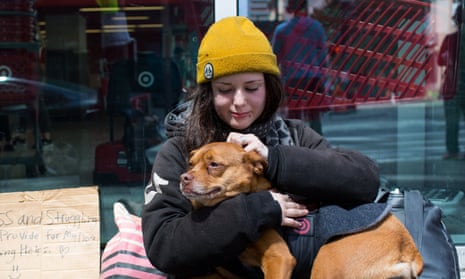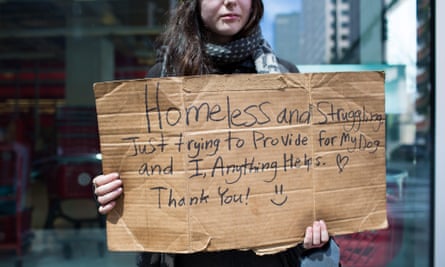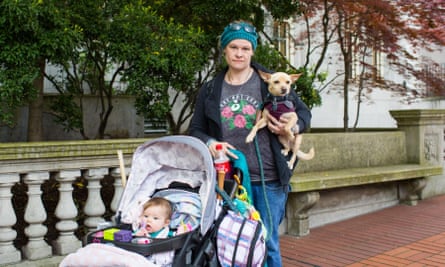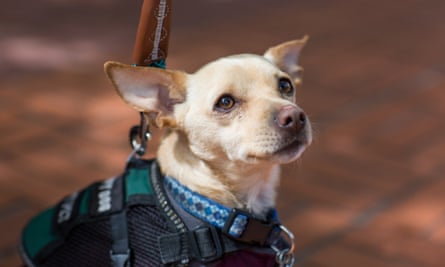Four people share stories of animal companions as experts say they take better care of pets than those with housing. Homeless people find spiritual support in dogs.

Heather, 22, Seattle
Before we found Poppy, I didn’t feel like I had anything to wake up for. I was going through a rough time in my life and didn’t care about myself. I’d been homeless since my parents told me to leave our family house in June 2016 and were so miserable in my situation. Everywhere I go people shun me and tell me to leave.
Then, last March, I was walking around downtown Seattle with my boyfriend when we saw a group of guys with two dogs. They were yelling at one of them and she was shivering and scared. I went into a store and when I came out my boyfriend had the dog. I was confused. He said to me: “I made a life choice without you; we’re keeping the dog.” He’d paid the guys $5 for her.
It was an eye-opening moment for me to look at her properly. She raised her head with a look that said: “Please don’t hurt me.” She had protruding ribs, fleas, missing patches of fur, and couldn’t walk properly. I wrapped her in my jacket like a baby and promised I’d never let anybody hurt her again. And that’s my promise to her for the rest of her life. We named her Poppy after a poppy seed muffin she was trying to eat off the sidewalk.

the Federal Housing Act
We moved from sleeping in a doorway to a tent. I stopped stealing food from stores when we were desperate; I didn’t want to go to jail for something dumb and risk losing her. I’ve applied for food stamps and now have a case manager helping me get on a housing list and get Poppy registered as a service animal so that we’re protected from being split up [by the Federal Housing Act].
People comment about how I shouldn’t be on the street with a dog. But they probably have a misconception that she’s not being taken care of. Twice a month the Union Gospel Mission does free pet care. I feed her at specific times with foods that the vet has told me will keep her healthy. I get money for her food from panhandling. She’s literally with me 24–7. She wakes up so excited every morning and gets so happy about the littlest thing, like rolling around in the grass or even just the weather being nice. Seeing her like that reminds me to stay happy for simple things too. In my mind, she’s a little angel that saved me as much as I saved her.
Kate Fraser Daley, 39, Portland, Oregon

When my family became homeless last June, some of the time we had Tenny, our four-year-old chihuahua-terrier mix, with us, and some of the time he was with friends of the family. But he was so sad when we were apart. There were times when he wouldn’t eat and just wanted to sleep. His happy-go-lucky self wasn’t there.
We’d been in the same apartment for 10 years so the change was really hard on everyone. We decided to send our two cats, Snowflake and Mittens, to another friend’s house. Within the first week, Snowflake got out and ran away. My husband was heartbroken. A year on and just mentioning her name is still very emotional for him. Mittens passed away when our friends moved.

After he moved into a shelter
When we moved into a shelter, Tenny became extremely protective of all of us. Being part of a mobile family unit is difficult for a dog because everywhere becomes their territory to protect and there’s no actual home. We’re in a 25-family shelter at the moment. All the families sleep on bunks in one large room and we can only be there from 6 pm to 8 am. But Tenny is never satisfied with our surroundings. His barking has become incessant and he’s being snippety. I don’t think he’s going to calm down until we get back into an apartment. Then he won’t have to be running all over town trying to freakishly protect his family from the world, which is not the job of a dog.
Get the latest Chihuahua Buzz
I know it’s unfair on him. We try to give him all the love we can and help him work through it. My husband and I talked about whether we are going to have to take him back to the pound. We can’t afford a lawsuit and we don’t want to risk him being put down if he bites somebody. But I said to my husband: “We don’t give up on our family.” We’re working on getting into an apartment and will see how he calms down when he has his own space to protect again.
Richard Dyer, 52, Seattle

My two ferrets are called Ricky and Tiny. I’ve had Ricky for five years. I rescued him when I saw somebody walking him on the street and yanking him around on a chain. And I’ve had Tiny for almost three years and rescued him after someone threw him out in the woods. They were both skittish at first because of the way they had been treated, but now they’re leash- and litter box trained.
I had wanted ferrets as pets since I was a kid. I grew up in Fort Payne, Alabama, and we had them on our land, but they were so fast you could never catch them.
I’ve been homeless for a little over a year; it’s not the first time, but it’s the first time in a long time. My wife and I were living in an apartment and the rent went up by $150. We couldn’t afford it and didn’t have any place to go so we had no option. Right now we’re staying in a tent. I come downtown when the ferrets are out of food.

The shelters
Most shelters don’t allow animals. But I wouldn’t subject my family to one anyway – they are full of drugs and disease and lice. We’re in a sanctioned camp that’s supported by several agencies and we have electricity. We pay $60 a month to be there and our neighbors at the camp love the ferrets.
A while ago I was diagnosed with bipolar [disorder] and was suicidal. But since having these ferrets, I haven’t had any suicidal tendencies. They ease my stress. They come up to me every time I call and Tiny is always on my heels, he never lets me out of his sight. My favorite thing about them is how they play with each other. They can’t be apart from each other; their bond is magnificent.
Ryan Mikesell, 37, Hillsboro, Oregon
When I’m feeling overwhelmed by anxiety, my mini Labradoodle, Josie, climbs on my chest to calm me down. She won’t take no for an answer. She’ll be like, “Go ahead, tell me to get off. I don’t care.” I have PTSD and her doing that is a grounding mechanism for me. I feel things and she just senses it. She’s like my soulmate in dog form. My therapist loves her.
My animals are my family. The oldest is Jamie, a Jack Russell chihuahua I got eleven years ago when I was living in a house with my ex-partner. Jamie has had two litters and I’ve kept three of her puppies. In total, I have five dogs and my cat, Buddy, who I found abandoned in an alley nine years ago.
I’ve been homeless for eight years. I grew up in Olympia, Washington, but my parents were very abusive and I didn’t want to be anywhere near them, so I left for Oregon. I have agoraphobia and severe anxiety. I also have diabetes and need to have a refrigerator so I can keep eating healthily. I live in a motorhome that I have nowhere to permanently park. It used to be that as long as you regularly moved your vehicle, you could park in lots of places. But since the new mayor of Portland came into office, you can get a ticket and be towed in 20 minutes. I put a call out on Facebook saying I needed somewhere to park for six months and a woman offered me her driveway, which is where I am now.

The sleep
The responsibility of caring for my pets keeps me alive sometimes. Jamie gave birth to her second litter in the motorhome. Feeding them made her sick and I had to take over with a bottle. It took me an hour to feed all five puppies, and I had to do it every other hour throughout the day and night. It was crazy exhausting and lasted a couple of months. My friends tried to help but the puppies wouldn’t eat for anyone else but me. I think they were imprinted because I was at the birth.
We all sleep on my bed together. They each have their place and like to take turns on the pillow next to me. Jamie always has preferences because she’s the boss; everyone respects her. They’ve each got such different personalities. Josie is the icebreaker when we meet new people. I spend so much time with them that I’ve learned a lot about their mannerisms.
I have a healthcare financing credit card for emergency veterinary bills. It’s paid off right now and I freak out at the thought of another bill. But my dogs are my responsibility and there’s no way I would get rid of any one of them.






